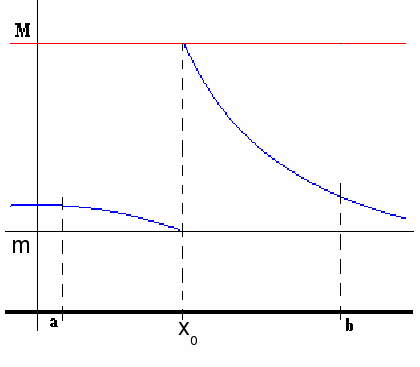A function![]() is Riemann integrable if it is continuous and bounded on a closed interval. Of course, if a function is differentiable then it is continuous and hence Riemann integrable but there are many examples of functions which are bounded but not continuous on a closed interval but which are still Riemann integrable.
is Riemann integrable if it is continuous and bounded on a closed interval. Of course, if a function is differentiable then it is continuous and hence Riemann integrable but there are many examples of functions which are bounded but not continuous on a closed interval but which are still Riemann integrable.

A simple example is shown above. The function has a discontinuity at![]() but is still Riemann integrable because this discontinuity occupies an interval of length zero. In fact if we construct a partition consisting of subpartitions on
but is still Riemann integrable because this discontinuity occupies an interval of length zero. In fact if we construct a partition consisting of subpartitions on![]() then
then![]() is Riemann integrable on
is Riemann integrable on![]() and
and![]() since it is bounded and continuous on these subintervals and on the subinterval
since it is bounded and continuous on these subintervals and on the subinterval![]() we have
we have
![]() and
and![]() so
so![]() (1)
(1)
Let![]() then
then![]() so Riemann integrability amounts to being Riemann integrable on the intervals
so Riemann integrability amounts to being Riemann integrable on the intervals![]() This can be extended, so that a function with a finite numbers of discontinuities, each of length zero, is Riemann integrable. Another example is given by the function
This can be extended, so that a function with a finite numbers of discontinuities, each of length zero, is Riemann integrable. Another example is given by the function
